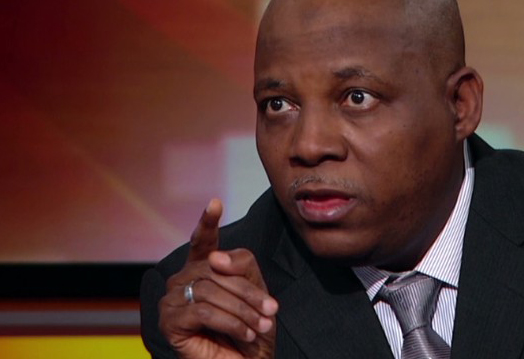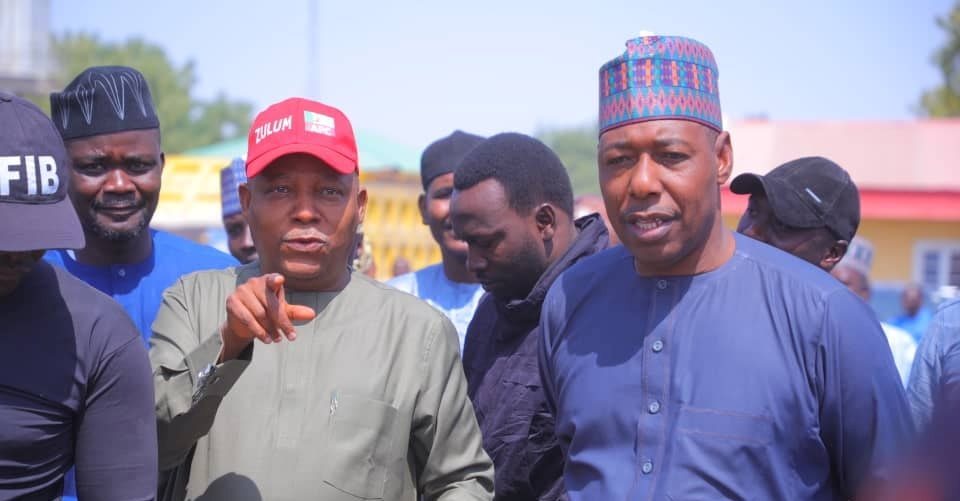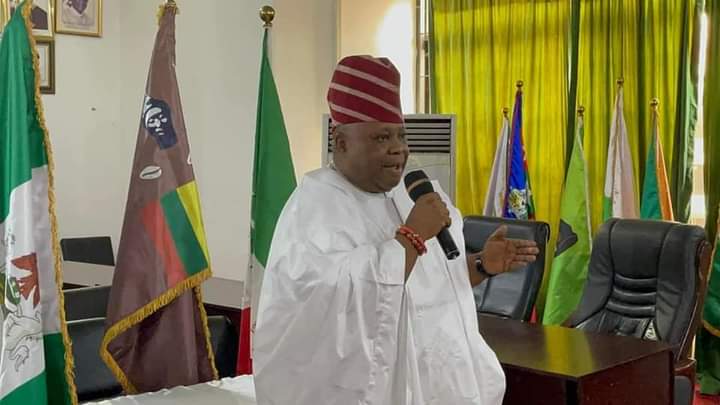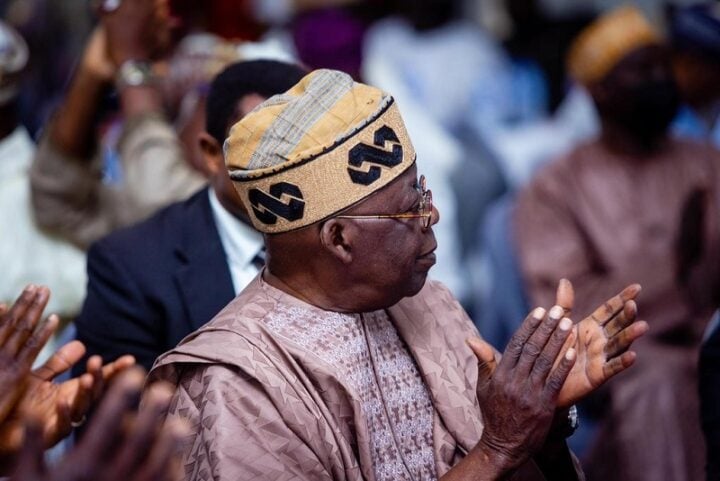Finally, Bola Tinubu, presidential candidate of the All Progressives Congress (APC), has announced his running mate for the 2023 election. The announcement comes after a meeting of some APC chieftains with President Muhammadu Buhari in Daura, Kastina, on Sunday. Kabiru Masari stepped down from his “placeholder” position and Kashim Shettima, former governor of Borno, took his place on the party’s ticket beside Tinubu.
For the first time since the historic 1993 presidential election with Moshood Abiola and Babagana Kingibe on the ticket of the Social Democratic Party (SDP), a mainstream Nigerian political party would be fielding a same-faith ticket.
Many consider this a risky move for the APC given the religious sensitivities, but Tinubu has probably done their calculations.
TINUBU’S FOOT SOLDIER
Advertisement
Those in the Tinubu camp are not shocked at the choice of Shettima as he has been one of the staunch advocates of the former Lagos governor’s presidential bid, and both are known to be good with each other.
TheCable understands that Shettima was to be officially unveiled on Tuesday but as soon as the news of his nomination leaked, Tinubu decided to go public on Sunday.
Shettima has been a media face of Tinibu since the former Lagos governor declared his presidential bid.
Advertisement
In January, he declared “we owe him” as he threw his weight behind Tinubu’s presidential bid. In June, in the lead-up to the APC primary, Shettima warned that it would be “catastrophic” for the party if Tinubui was not elected as its presidential candidate.
He also ripped into Vice-President Yemi Osinbajo who was contesting against Tinubu in the primaries. He said Osinbajo was a nice man but “nice men should be selling popcorn, ice cream”, adding that Tinubu would make a better president.
Shettima later apologised to Osinbajo, saying his remarks were not meant as “ridicule but, rather, to stir up interest in the contrasting virtues of the cast of aspirants putting up a fight against my preferred aspirant”.
RESTRUCTURING VS NANOTECHNOLOGY
Advertisement
At the launch of a book by Bolaji Abdullahi, former minister of sports, in Abuja in November 2017, Shettima stirred a mini-controversy when he launched a blistering attack on the campaign for the restructuring of Nigeria, insisting that it is the quality of governance that needs restructuring.
“Restructuring my foot!” he said.
“Let’s restructure our minds. Let’s restructure the quality of governance. When people are talking of artificial intelligence, when others are talking of robotics engineering, of nanotechnology, we are talking of restructuring the federation. Our problem is not an issue of devolution of powers, let’s be very honest.
“Our problem, as Chinua Achebe rightly encapsulated, is largely that of leadership. Leadership that will put the nation first is much more important than restructuring the nation. Let’s restructure our minds. Let’s restructure our quality of leadership.”
Advertisement
Nanotechnology is the revolutionisation of technology and industry sectors such as information technology, medicine, transportation, energy, and environmental science, among others, to make humans live better and smoother.
‘ACCIDENTAL GOVERNOR’
Advertisement
Shettima began his political sojourn in 2007 when he was appointed as a commissioner by Ali Modu Sherrif, then governor of Borno. He served in five different ministries.
Upon the completion of the Sheriff’s tenure, a silver lining in the cloud of misfortune sent fate down the path of Shettima: in January 2011, Modu Fannami Gubio, the All Nigeria Peoples Party (ANPP) governorship candidate in Borno, was shot dead.
Advertisement
Shettima was elected as the party’s candidate in a second primary held a month later. He went on to be governor of Borno state for two terms, and has been praised for backing Babagana Zulum as his successor.
Zulum has enjoyed good reviews as governor of Borno state and was one of those being touted as potential running mates to Tinubu.
Advertisement
Shettima was elected a senator in 2019.
AT WAR WITH BOKO HARAM FOR EIGHT YEARS
Shettima’s tenure as governor of Borno, the “Home of Peace”, from 2011 to 2019 was marred by Boko Haram insurgency.
He once said: “Between 2013 and 2014, we witnessed the most daring and most vicious evil of the Boko Haram, losing 20 LGAs of the 27 in Borno, establishing caliphates in a territory almost twice as big as Lagos state.”
He said Boko Haram insurgents “destroyed 156,453 houses in Borno. The houses represent about 30 percent of the housing stock in the state.
“They also destroyed 5,344 classrooms in 21 primary schools, destroyed 38 secondary schools and two tertiary institutions in the state.
“The insurgents also destroyed 665 municipal buildings, including local government secretariat, police stations, as well as 201 health facilities.”
He was the governor when Boko Haram insurgents invaded the Government Girls Secondary School (GGSS) in Chibok local government area of Borno state from where they abducted 276 students.
THE CHIBOK BLAME GAME
In the aftermath of the Chibok girls’ abduction in April 2014, the federal government led by President Goodluck Jonathan took the majority of the blame for its slow response to the attack.
However, after Shettima claimed, in 2017, that Jonathan almost removed him as Borno governor in 2014 with the belief that he was responsible for the disappearance of Chibok schoolgirls, the former president struck back.
In a statement by Ikechukwu Eze, Jonathan’s spokesperson, the former president accused Shettima of exposing the girls of Chibok Secondary School to danger by failing to heed the federal government’s directive to relocate them while writing the West African School Certificate Examinations (WASCE).
“He should be able to tell us if it was Jonathan’s poor choices that led the Governor to expose students of Government Girls Secondary School in Chibok to avoidable danger, in total disregard of a Federal Government directive to the Governors in the three states most affected by Boko Haram to relocate their students writing the West African School Certificate Examinations to safe zones,” the statement read.
“It is instructive that while other governors in the zone heeded the security advice, Shettima remained the only one that flagrantly flouted it.”
The former Borno state governor hit back and accused Jonathan of deliberately omitting facts about the abduction of Chibok girls.
He said the former president attempted to sweep under the carpet a report submitted to him by an investigative committee in June 2014 about the abductions.
THE BANKER
Born on September 2, 1966, Shettima was educated at the Lamisula Primary School in Maiduguri from 1972 to 1978 before proceeding to Government Community Secondary School in Biu LGA and the Government Science Secondary School, Potiskum, for high school education from 1978 to 1983.
He earned his first degree in agricultural economics in 1989 and, two years later, obtained a master’s degree in the same discipline at the University of Ibadan.
Upon completion of his second degree, Shettima was employed as a lecturer at the University of Maiduguri’s department of agricultural economics, where he taught until 1993 before segueing into the banking sector.
He was employed as a head of accounts at the now-defunct Commercial Bank of Africa Limited in Lagos and moved to become a deputy manager at the African International Bank Limited in 1997. He would be promoted to a manager in 2001.
He joined Zenith Bank as head of its main branch in Maiduguri in 2001. Shettima rose through the ranks of the bank and became its zonal head in the north-east. He left the bank as a general manager in 2007 when he was appointed as commissioner for finance in Borno state.
He and his wife, Nana, have three children.
Add a comment






